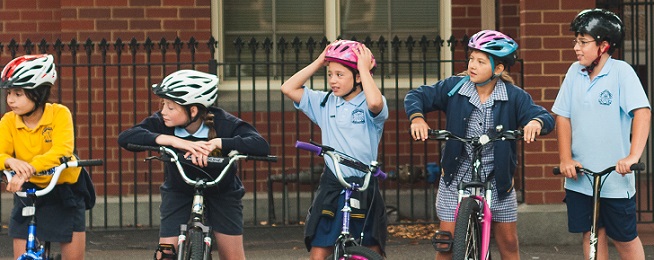New local research has found that children are being driven to school instead of riding a bike or walking because parents would rather combine the school drop-off in a car with the commute to work or other trips.
The practice has been labelled 'trip-chaining'. Parents will leave home with children in the car, drop them off at school and then drive to something else like work, the shops or an appointment.
Trip-chaining is thought to be one of the key reasons for why more than 60 per cent of primary school students do not ride, walk or use other types of active transport to get to school, despite living only a short distance from school.
The research published in the Journal of Transport & Health surveyed 713 Melbourne households with children who live within two kilometres of their school.
Only 65 per cent of those who lived within 750 metres of school—a two minute bike ride—use active travel to get to school.
Just 37 per cent of those who live between 750 metres and 1.25 kilometres from school, and a paltry 18 per cent of those between 1.25 and two kilometres from school, are riding or walking.
The report suggests that one of the reasons parents choose trip-chaining is because the street environments in local neighbourhoods do not make it easy enough for students to ride and walk.
It has caused Dr Alison Carver from ACU's Mary MacKillop Institute for Health Research to say we have created a "backseat generation" and call for drop-off and pick-up zones to be created within 800 metres of primary schools.
“It is quite shocking how many within 750 metres of the school gates are still being driven but we know there are several factors behind this including parents fitting pick-ups and drop-offs into their busy schedules, and the walkability of their neighbourhood.”
“Improving the physical environments around schools to make them accessible by well-connected footpaths and bike trails as well as reducing traffic risks and hazards, are crucial steps in getting more children to make that daily walk to school.”
Trialling car-free zones around schools is something that Bicycle Network's Ride2School program has been investigating as a way of introducing students to active travel and showing them how easy riding and walking can be.
Ride2School works with schools and students in a number of ways to increase active travel rates so children get their recommended 60 minutes of daily exercise.
The free program is having success, with schools that actively engage with Ride2School reporting active travel rates of 45 per cent on average, nearly more than double the national active travel rate of 25 per cent.
This is done by working with schools to give students bike education, map out fun and easy active travel routes and showing children the joy of riding with special school visits and an annual event, National Ride2School Day.
To get involved in the Ride2School program, register your school for National Ride2School Day on Friday 22 March 2019 or discuss being involved in a car-free trial with the team, visit www.ride2school.com.au.
Click here to read more about the recent study into active transport among students or download the research paper.
Block "6211" not found


